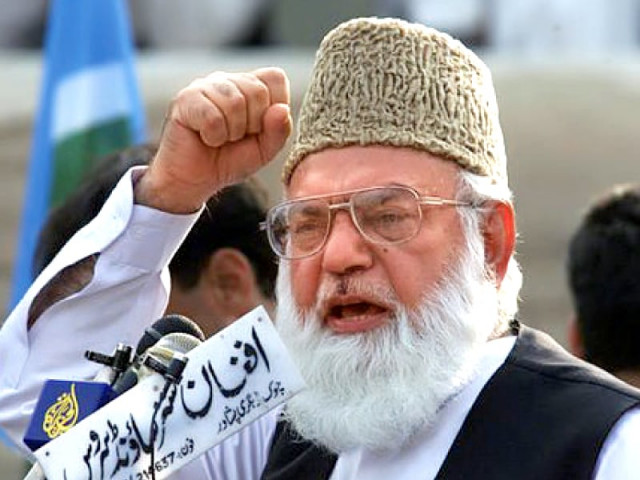Analysis: Qazi leaves indelible mark on JI politics
The late Jamaat chief mentored most of party’s present leadership.

While there is no denying the legacy he leaves behind, it is unclear, however, how much his leadership will influence JI’s future decision-making. PHOTO: FILE
Qazi took the party’s reins from Mian Tufail Muhammad in 1987. The following year, the country would start its transition to democracy after military dictator Gen Ziaul Haq’s over a decade-long reign came to an end with his death in a plane crash.
At the time, the JI faced two main challenges: On one hand, the party shifted from a pro-establishment to a more populist politico-religious group; while on the other hand the JI witnessed its influence waning in Karachi following the emergence of Muttahida Qaumi Movement.
While it proved to be an uphill task to shed the legacy of supporting Zia’s regime – Qazi himself steered the party into the Islami Jamhoori Ittehad, which was later revealed to be a ploy by the establishment to keep Pakistan Peoples Party from power – Qazi was somewhat successful on both counts.
Despite occasional fiddling with the establishment, the JI managed to muster some popular support. Meanwhile, the party compensated for the loss of Karachi by entrenching itself in rural Khyber-Pakhtunkhwa (K-P).
JI, Afghanistan and MMA
Afghanistan and politico-religious forces in Pakistan, particularly in K-P, have historically been intertwined.
During the “Afghan Jihad” against Soviet forces in the 1980’s, the JI remained a close ally of Gulbuddin Hikmatyar’s Hizb-e-Islami. Due to Hikmatyar’s dominance among the Afghan resistance groups, the JI was able to exercise substantial influence in Afghan affairs.
JI’s clout in Afghanistan started to erode, however, due to the increasing strife among various Afghan warlords and resistance groups following the departures of the Soviets. With the emergence of the Taliban in Afghanistan, JI’s influence in the country was replaced by that of its rival Jamiat Ulema-e-Islam Fazl (JUI-F).
After the US invaded Afghanistan, the traditional rivals formed an alliance along with other right-wing groups in the country under the moniker Muttahida Majlis-e-Amal (MMA). The alliance outperformed mainstream political parties in K-P, forming a government in the province, and was able to grab a sizable number of seats in both Balochistan and National assemblies. MMA’s role in national politics triggered renewed suspicion of a “mullah-military nexus”.
Qazi tried to counter the perception by separating the JI from the K-P government during President Pervez Musharraf’s election bid in 2007 and boycotted the 2008 parliamentary elections. To some degree, this heralded the end of Qazi’s populist dreams.
Post-Qazi JI
Being JI’s longest serving leader, Qazi has left an indelible mark on the party that is likely to stay for a long time. His tenure corresponded with JI’s formative years – indeed, much of the party’s present leadership was mentored by Qazi.
While there is no denying the legacy he leaves behind, it is unclear, however, how much his leadership will influence JI’s future decision-making.
So far, Qazi’s successor Syed Munawar Hassan has not tried to re-orient the party from where his predecessor left it. He chose not to steer the JI towards the resurrected MMA and opted instead for Difa-e-Pakistan Council (DPC) – an alliance of right-wing groups which also includes banned outfits.
Given JI’s present slant towards the DPC, one wonders whether post-Qazi the party will relapse into the establishment’s closet ally.
Published in The Express Tribune, January 7th, 2013.



















COMMENTS
Comments are moderated and generally will be posted if they are on-topic and not abusive.
For more information, please see our Comments FAQ